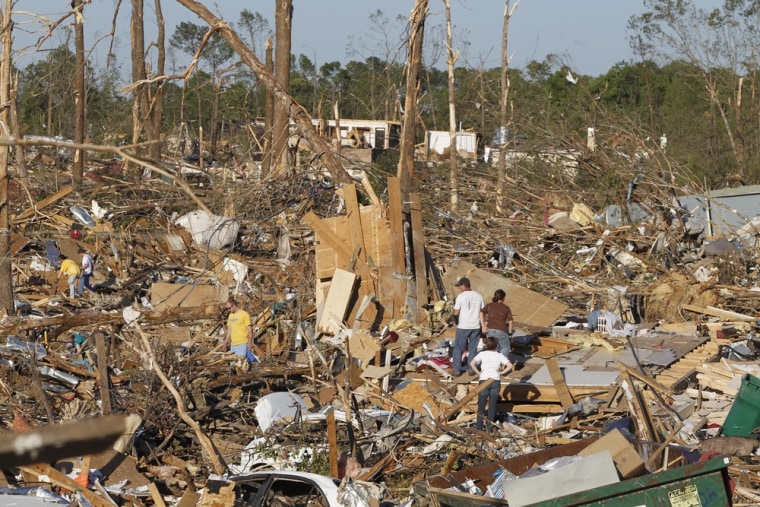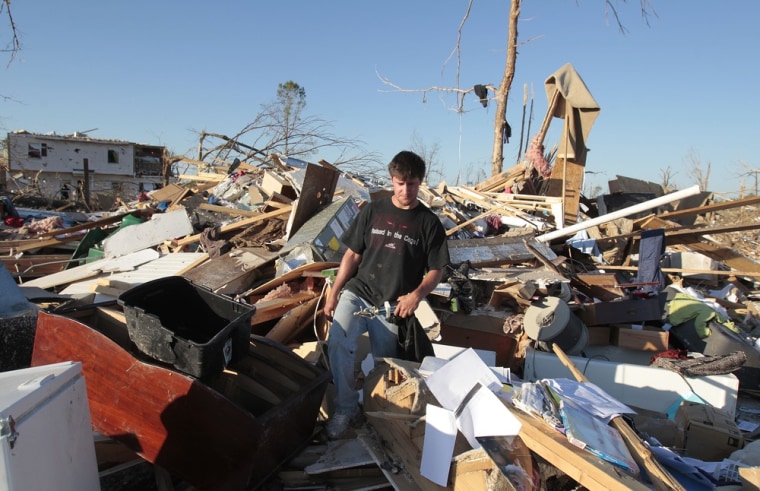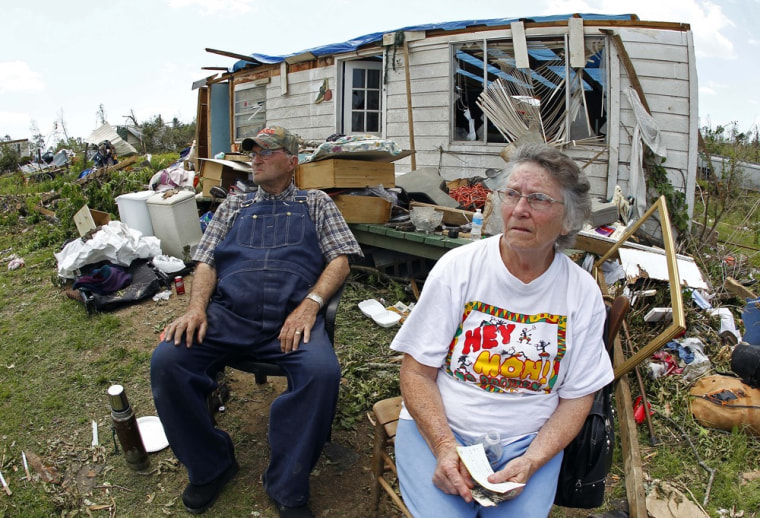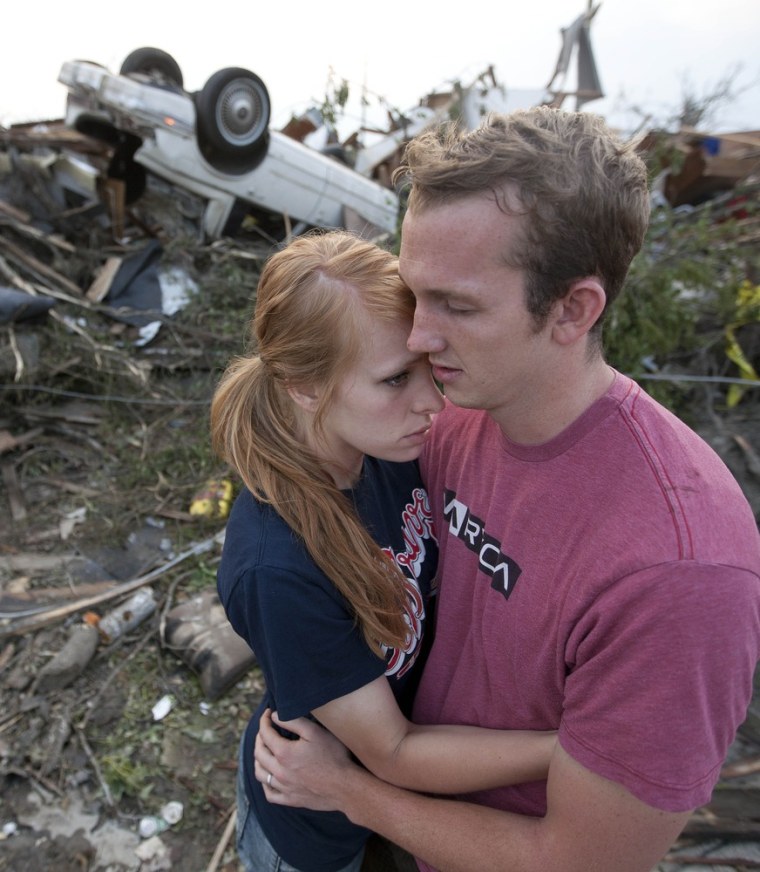All morning at work, the boss' wife stared at the storm alerts flashing across the television screen and fretted. By 2:30 p.m., when they closed the restoration shop early and sent employees home, Jonathan Ford paid little mind to the sunshine overhead.
Fear of weather was playing havoc with his day. Ford had been hearing tornado warnings since he was a kid. And though he'd always done what he'd been told and sought out shelter, the 21-year-old found it hard sometimes to take the alerts too seriously.
But this warning, in addition to cutting work short, had also canceled his night classes at Jefferson State Community College. That left Ford in his pickup, with instructions from his mother to stop only for bread and dog food, then come straight back to their neighborhood of towering oaks and neat brick homes in the rolling hills west of Birmingham. Dinner would be waiting in the microwave, he knew. And the dogs, Smokie and Ginger, would no doubt be glad to see him.
Across the South, in thousands of homes like the Fords', the hours of repeated tornado warnings had seeded a strange kind of tension: well-founded and very real fears pushing up hard against a tempting illusion — one encouraged by the momentarily gentle afternoon weather and unexpected free time — that the state of alert might turn out to be nothing at all.
In Rainsville, Ala., to the northeast, Donald Tidmore and his family sat down to an early dinner of taco salad that still left him with time for a nap on the couch. In the town of Phil Campbell, Ala., Gloria Butts worked on her taxes, waiting for her husband, a pastor, to come home from church. Further east in Barnesville, Ga., Dennis and Nealy Strom tucked their two children in to bed and settled under the covers to watch the news, reassured by reports that the worst would pass them by.
Evening had come early, under Alabama skies blue enough to inspire a tune.
But the darkest hour was just minutes away.
Watching warnings and waiting
With the tornado warnings gaining urgency, the Fords' next-door neighbors on 12th Street, teachers Debra and Rick Patterson, also got off from work early.
Alabama's high school baseball playoffs were starting and Rick, coach of the Hueytown Gophers, had planned an afternoon practice for his team. But the storm had left him with little choice but to cover the field with a tarp and hope for the best. Instead of heading home to meet his wife, he drove to the hotel in Bessemer where they'd been staying since early March, ever since a kitchen fire forced them out. Just this week, city inspectors had given contractors the go-ahead to start renovations that would get them back home. But for all the inconvenience, the fire had taught Debra Patterson a life lesson: You could lose material possessions and still come out whole.

Now, in their room at the Fairfield Inn, the Pattersons turned on the television and shared the hotdogs Debra had picked up on her way, paying closer attention as the promised clouds began to blot the sky. About 4:20 p.m., a newscaster announced that a powerful storm cell was bearing down on Tuscaloosa, about 45 miles to the southwest. Debra immediately called to warn her daughter, Stacy, a sophomore at the University of Alabama.
"Baby, you have to go downstairs," Debra told her daughter.
At about the same time, on the second floor of the Charleston Square Apartments eight blocks from the Alabama campus, Daniel Mulder, a 24-year-old senior at the university, studied quietly for the final exam in cell biology final while his wife, Rachael, a first-year nurse, slept off the wear and tear of her night shift at the hospital.
Mulder had heard Tuscaloosa's tornado warning sirens go off before. Nothing ever seemed to come of it, so he wasn't particularly concerned when they began sounding yet again. He looked out the window: sunny and calm.
Not far away, in Tuscaloosa's Alberta City neighborhood, Roosevelt and Maggie Lee were tracking those same warnings. The Lees had been married for less than three weeks and Roosevelt, a 47-year-old minister, had moved from Selma to the campus town to be with his new bride.
From inside the wood-frame house they share with Maggie Lee's daughter and two granddaughters they could hear the wind begin to swirl across the roofline and around the windows.
At home in Pleasant Grove, Jonathan Ford ate the chicken and noodles his mother, Beverly, had set aside for him. When she left to take shelter at her boyfriend's home because it had a basement, Ford told her he'd stay put to take care of the dogs. He settled in to the reclining chair to watch the television news of the storm and listened with new urgency at reports that Bessemer was in the crosshairs. He called his girlfriend, Tara Rudloff, at her home near there.
"It's about to hit you all. Take care," Ford told her. "I love you."
Minutes later, hail began pelting the Ford house, making it sound like someone was throwing rocks against the windows.
At the same time, across the state in Rainsville, Donald Tidmore left work at the Heil garbage truck factory under a calm, partially sunny sky. Just as the family sat down to dinner, the power went out and they ate in shadows. But there seemed little to worry about. Tidmore fell asleep on the couch, while his stepson, Wells, went to his room and texted with friends.
The warnings back in Tuscaloosa, though, were growing more dire as the sky darkened and the wind picked up. Then, just before 5:30 p.m., it began to howl.
"It kept building and building," Mulder says. "I thought, 'Wow, something's happening out there.' It didn't kick in all at once. I had to sit and listen for a moment. 'Is this real, do we need to take cover?'"
He made a split-second decision, dashing into the bedroom where his wife was sleeping. "Hey, Rachael!" he yelled. "We have to get in the bathtub! Get in the tub now!"
Just then the power went dead, and the couple fumbled their way toward the bathroom in the dark. In the tub, Rachael sobbed with fear, folding herself into a ball as her husband wrapped his arms around her. Outside their cocoon, the storm shrieked like "nails on a chalkboard."
At the Lees' house, the wind outside mutated into a roar.
That was enough for Roosevelt Lee. The minister hustled his family toward the back of the house, directing everyone to an old iron bathtub and ordered his wife and the children — 15-year-old daughter Faris, 7-year-old granddaughter Madison and 1-year-old granddaughter Brendanee — inside. Then he flung himself on top of them like a blanket.
No sooner had they formed a sandwich of bodies than the Lees heard the splintering and popping of wood and metal — the sounds of the house being peeling away from around them.
Then a back wall exploded off the foundation and the outside thundered in, lifted the tub with five passengers aboard off the floor — and sucked it out through the gaping opening like a torpedo.
Storm swallows whole sky
At the hotel in Bessemer, the Pattersons leaned toward the televisions as reports came in that Tuscaloosa had been hit hard. But when they were able to reach their daughter by cell and heard she was safe, they figured the worst was over. They joined other hotel guests in the parking lot, staring toward the western horizon as the enormous funnel cloud a few miles to the west.
Debra had seen such storms before, but never anything like this one — it seemed to swallow the whole sky and when that wasn't enough for its appetite, it reached down to paw at the land. Yet for all its fury, on the backside of the funnel, blue sky followed.
But what had the storm done with the Lees?
Inside the bathtub, the family tumbled and spun through air, until they were flung free. Faris, the 15 year old, landed in the driveway. Lee and her grandson were dragged across the ground, rasping their skin like sandpaper. Maggie grabbed hold of a stanchion from the carport, screaming, "Jesus, Jesus, Jesus!"
When the wind diminished, Lee climbed to his feet and surveyed the landscape. Most of his house had landed across the street. He climbed atop the rubble and saw the baby Brendanee partially buried in a hole of mangled wooden studs. He pulled her out and began running toward help through the rain and wind.
Up Interstate 20, Debra Patterson realized the storm was heading for the fire-damaged home she'd left behind. But an empty house was far from her only worry. A second daughter and her husband lived in the neighborhood, too.
And the storm was moving fast.
In Pleasant Grove, hail continued to drum the Ford house. But the television was still the loudest sound until the angry snap of a tree breaking jolted Jonathan Ford to attention.
He called to his beagle and Labrador retriever, but they refused to join him in the shelter under the staircase (later, much later, he would find them alive). He dashed for cover so fast he dropped his cellphone, before hunkering down in the darkness with his hands wrapped around his head and his eyes closed. A powerful smell — as if a lumberjack had cut up scores of pine trees — filled the air.
Then the house began to rip apart.
Shards of sheet rock razored across Ford's face and wallboard and insulation filled his ears. The staircase collapsed on top of him and the pressure of the storm pushed down, relentless in its power. But trapped in the grotto, Ford says he felt a strangely comforting sensation, as if a hand was stroking his shoulders.
"My granddad died about two years ago in April ... and we were real close," he says. "It just felt like him and God were just rubbing my back, telling me it's going to be OK."
Forty-five seconds later, the funnel roared on in search of its next victim. But the Fords' two-story brick house and all those surrounding it had been obliterated. Trapped under the collapsed staircase, Jonathan Ford dug down through the sheet rock, until he was able to free himself. When at last he stood up and looked southwest, all he could see was a white light, and for a moment he wondered if he might be dead. But he hurt too much for that to be possible. And when he clambered to the top of his truck, and turned to the northeast, he watched as the funnel cloud about a third of a mile wide raked across the landscape.
Then, as it receded and the roar began to fade, Ford stood atop his perch, cupped his hands and hollered with all the power he could muster to whoever might hear: "Is everybody OK? Can anyone else hear me?"
'Get in the closet'
And still the storm raged, carving a swath to the north and east, a path of destruction worse than anything this tornado-prone region has ever experienced.
At 6:30 p.m. in northeast Alabama, Sharon Tidmore picked up her smartphone to check the system's progress, but couldn't get a signal.
Her husband heard a high-pitched whining that sounded like tornado sirens. He reached for the door, peering outside to investigate.
Those weren't sirens.
There, directly across the road, a howling black pillar bore down on him. He slammed the door and bolted back in.
"Get in the closet!" he screamed to his family.
There was a horrible cracking as the garage peeled away from the house.
Then the bedroom wall blew out. Two-by-fours snapped like toothpicks.
"It was a terrible sound, like every sound put together," Wells said. "It was like all of hell was coming down on us."
The boys felt themselves being pulled away, sucked into the maelstrom.
"I tried to hold onto my mother and brother, but then it started dragging and I couldn't hold on to anything," Nick said.
The house — now just a stream of bodies and debris — was yanked from its foundation and lifted across the back yard, where it slammed into a stand of trees.
And then, in the next moment, it was over.

The funnel churned into the forest, then "disappeared like it had never been there," Wells said.
He was the first to get up. The storm had dragged him on his back about 150 feet. His mother and stepbrother were about 10 feet away, dazed but unhurt.
Ronald Tidmore was unconscious when the others found him. Stirred from his stupor, "people were talking to me, but I couldn't hear them," he said.
His house was obliterated, but next door, the funnel had plucked a house from its foundation and set it down, perfectly intact, 200 feet away. He turned to look across the road. There a neighbor's home sat untouched.
Back in Tuscaloosa, Daniel Mulder cautiously opened the bathroom door to find the exterior walls of their apartment gone, the roof ripped away. He climbed out the kitchen window and picked his way through debris, before spotting a woman unconscious in the parking lot, her body covered in blood and bruises. He ran back upstairs for his wife, urging the nurse to hurry. "Someone's dying!"
Rachael grabbed a first-aid kit. The woman was breathing and had a pulse. But her torso had been ripped open, like something "out of a horror movie." She needed a trachea tube and suction, a bag to help her breathe. But Rachael could only hold her, helplessly. Moments later, the woman let out a gurgle and then fell silent. The Mulders covered the body with a tarp.
"Why her?" Rachael says. "Why wasn't it me?"
'Mom, everything's gone'
Back in Pleasant Grove, Jonathan Ford watched from atop the cab of his pickup as his neighbors slowly climbed from the rubble in the silent landscape.
Then, from where Curt and Crystal Grier's house had once stood, two doors down, a voice pleaded: "Please help! Please help! We've got babies stuck!"
The Griers and brother-in-law Josh Lowe had escaped from the crawl space under their collapsed porch. But the couple's two children, Curt's sister, Carrie Lowe, and her newborn baby, Tucker, remained trapped. All that was left of the house was the brick front steps. Slowly, the men extracted the screaming children from the rubble. But when Jonathan Ford went to help dig, and he reached for Carrie Lowe, hunched over her son's car seat, her body was cold to the touch. The baby was alive, in the seat.

Later, after the rescue crews had come to take away her body, friends marked the spot with a red rag tied to a splintered piece of wood and placed a Bible found in the wreckage on the steps.
But now, Ford knew, he had to find his mother.
He set out on foot, walking through a surreal landscape of trees trunks stripped naked and snapped in half, cars tossed about like toys. Until an hour or two earlier, one of Pleasant Grove's most distinctive features had been its thick canopy of older hardwoods that provided rich shade, but limited views.
Now, Ford could see across the ridges for half a mile, easy. He quickened his pace, searching the road ahead for something or someone familiar. Police weren't letting cars through. But finally, at the intersection known as the Five-Way, Ford thought he recognized a truck. He saw a woman climb out, and his heart beat faster.
He leapt forward, willing his feet to move faster.
That's when Beverly Ford turned and recognized her son.
"I've never been so proud of my son as when he was running down the street, tears running down his face and his arms wide open," Beverly Ford says.
"Mom, Mom," he said, "everything's gone."
